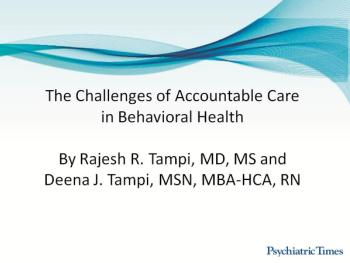
It seems ironic that the Oedipus myth about self-inflicted blindness is so central to psychiatry, but there are few guidelines on treating sensory loss. Here, the evolution of an APA workshop on treating patients with visual impairments.

It seems ironic that the Oedipus myth about self-inflicted blindness is so central to psychiatry, but there are few guidelines on treating sensory loss. Here, the evolution of an APA workshop on treating patients with visual impairments.

Presenting a Q&A with Dr Rajesh Tampi and Deena Tampi on the issue of behavioral health in accountable care.

Running into an old friend at the American Psychiatric Association Annual Meeting: Use hashtag #APAAM14.

Emergency psychiatry is helping to redefine acute mental health treatment-facilitating timely access, in less restrictive, outpatient levels of care, for patients in crisis.

There’s a lot going on at the American Psychiatric Association Annual Meeting in the Big Apple this year . . . so much, in fact, that we’ve invited the Chair of Scientific Program Committee, Dr Philip R. Muskin, to provide you with a road map. More in this podcast.

Global child mental health in low- and middle-income countries faces all of the challenges of Western society and many more. This article examines the issues.

It is time for psychiatry’s critics to drop the conspiratorial narrative of the “chemical imbalance” and acknowledge psychiatry’s efforts at integrating biological and psychosocial insights.

What is your first impression of this ink blot?

This article focuses on 2 ethical issues that the new CPT coding raises to higher stakes: the increased potential for conflict of interest in billing and the erosion of confidentiality.

How does psychiatry in Spain differ from the US? More in this video vignette.

The universe of psychiatric ethics has dramatically expanded. Let us boldly go together where psychiatric ethics has never gone before!

Case-based dialogues illustrate some virtues required in psychiatric practice.

What harms are there in labelling (or rather often mislabelling) more than a quarter of our troops as mentally ill? The harms are numerous and potentially quite dangerous. . .

As psychiatrists, we have a potentially unique-and powerful-influence in the discussion of public figures. But what professional and ethical obligations should we follow in this role?

Federal law now strongly supports a patient’s right to view his or her psychiatric record on request. Here: a look at the ethical and legal issues.

Sid Caesar, who died on February 12, not only pleasured millions . . . he helped me get through a reasonably tormented adolescence.

The new Pope's message resonates with what is becoming a prevailing ethos of good mental health care--a belief that everyone has promise, can recover and rebuild from life's misfortunes and should be able to have what we all want.

Statutes in 8 states are not designed to assure informed decision-making, say these psychiatrists; instead they represent an unprecedented effort by the government to use physician communications as an instrument for discouraging pregnant women from exercising their constitutional right to make their own reproductive choices.

It may be difficult for our American and European colleagues to imagine the constraints under which Russian psychiatrists practice. In Russia, treatment of the psychiatric population is at the mercy of government and society.

How prevalent is dependence on amphetamines, cocaine, opioids, and other illicit drugs across the world? What is the associated disease burden? Insights here.

In order to make positive changes in the field of psychiatry, it is important to appreciate and understand the current challenges and significant limitations of the present approach to psychiatric therapy.

In the eyes of many, the current societal approach to the treatment of psychiatric disorders cannot possibly be considered humane. More in this commentary.

Insurers appear to have plenty of leeway to continue-or even expand-the kind of anti-psychiatrist policies at the core of 2 lawsuits filed last year. Details here.

PsychiatricTimes welcomes two new Editorial Board members, congratulates editor-in-chief, James Knoll, and introduces a reader advisory panel.

If clinicians are to take anything from the Johannesburg debacle, it is that we must be even more mindful of distress and despair. Like Poe’s purloined letter, profound sorrow may lie in plain sight under one’s clinical gaze-but not yet “thought upon.”